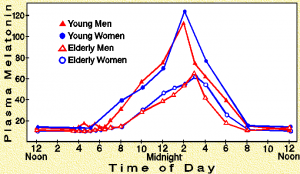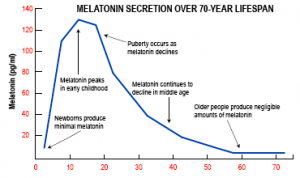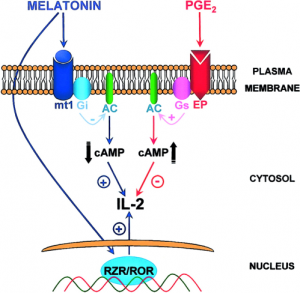Bear with me here… this could be very important (or just all in my imagination haha)
Fact: melatoninImage may be NSFW.
Clik here to view. secretion happens at night (or at least that’s when it’s supposed to happen):
secretion happens at night (or at least that’s when it’s supposed to happen):
Image may be NSFW.
Clik here to view.
And it’s important to adopt healthy circadian behaviors early on to prevent or minimize the age-related decline in melatonin secretion:
Image may be NSFW.
Clik here to view.
Part 2: Melatonergic signaling is intrinsically inhibitory in many cell types:
Image may be NSFW.
Clik here to view.
It turns down certain processes, and this is why many cell types proliferate at night. See: Sunlight and the Circadian Rhythms in your Skin. Skin cells shouldn’t be proliferating while they’re simultaneously trying to protect themselves from UV rays during the day. Something similar happens in skeletal muscle cells, beta cells, and many others (N.B. in these studies, pretreatment with melatonin in cell culture can be interpreted as analogous to overnight exposure to melatonin in humans, so the beneficial impact is most highly manifest in the morning).
As these programs aren’t being used (or being actively inhibited by melatoninImage may be NSFW.
Clik here to view. ), it’s said they are becoming sensitized.
), it’s said they are becoming sensitized.
By the time you wake-up in the morning, some of these programs like endogenous antioxidant enzymes and those involved with proper protein processing, attenuating ER stress, etc., are primed and and ready to process a big influx of nutrients (eg, breakfast).
We know skipping breakfast and eating late dinners is no bueno, long term… maybe this is why
A properly functioning circadian clock is necessary for this – without it, oxidative stress goes out of control and you age faster (rodent studies, but still).
As the day progresses, the protective mechanisms become progressively de-sensitized and less able to effectively manage [cellular] metabolic stressors like a big meal.
There just might be a reason things happen this way. Bright light in the morning makes you less sensitive light-induced melatonin suppression in the evening (eg, Kozaki et al., 2015). Avoiding artificial light at night or simply wearing hot blue blockers bolsters melatonin secretion which enhances sensitization, making you more able to optimally partition nutrients when the system is fully sensitized -> in the morning.
YES I’M SAYING TO EAT BREAKFAST AGAIN
Mythology? maybe… but seems legit to me
calories properImage may be NSFW.
Clik here to view.

